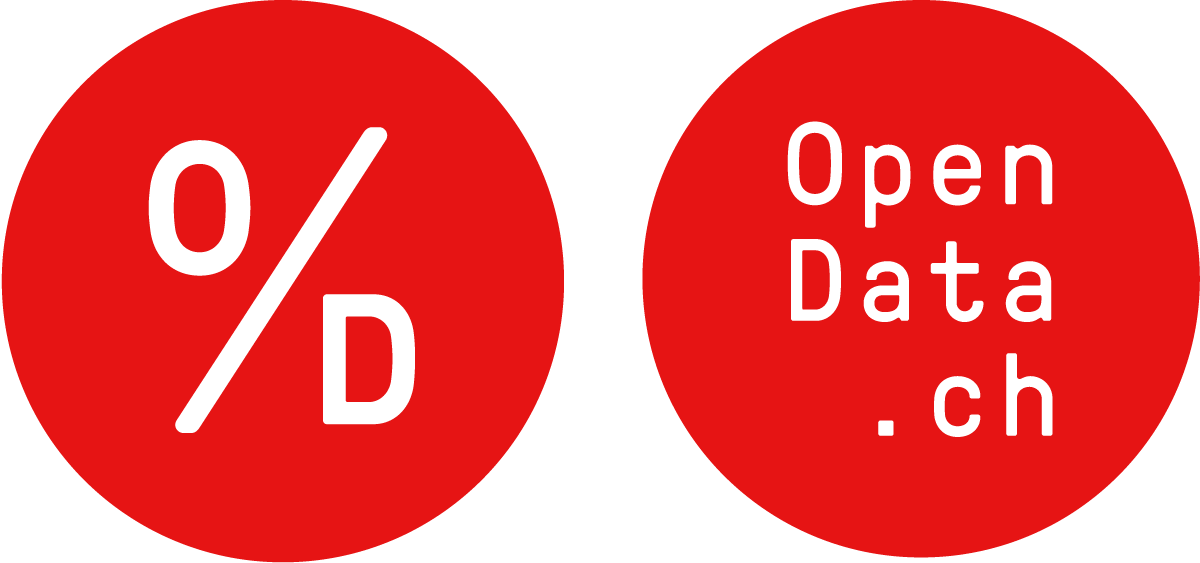GLAMhack23
- GLAM
- Hackathon
29. – 30.09.2023 @ Musée d’ethnographie de Genève, Geneva, free
Sign up now for the 9th Swiss Open Cultural Data Hackathon in Geneva.
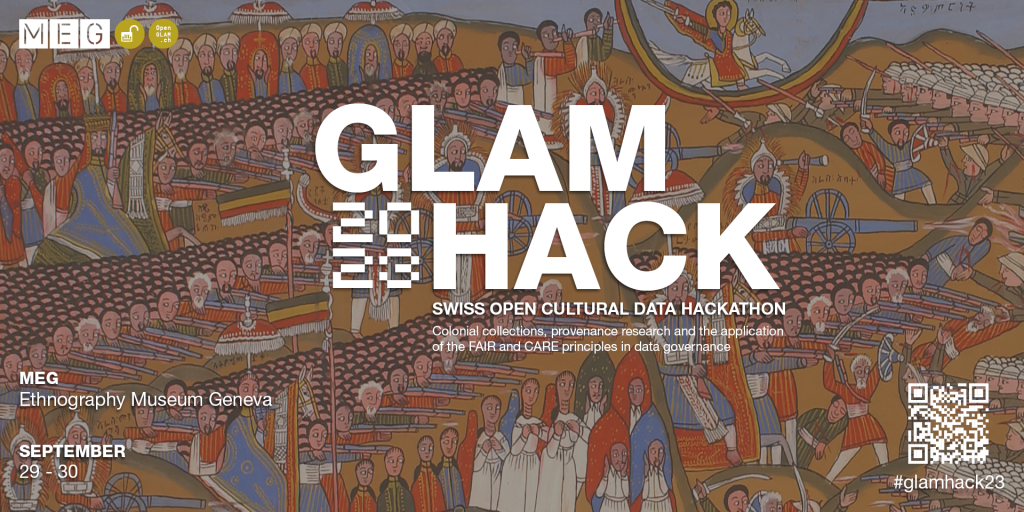
Once a year, the Swiss OpenGLAM working group brings together cultural institutions, software developers, digital humanists, artists, Wikipedians and other interested parties to promote openness among galleries, libraries, archives and museums (GLAM). At the GLAMhack, we collaboratively experiment and innovate with cultural content and digital tools for research, web and mobile applications, Wikipedia and other uses. This edition focuses on colonial collections, provenance research, as well as the application of the FAIR and CARE principles in data governance.
Join us for GLAMhack23 (29-30.9) at the Musée d’ethnographie in Geneva, where creativity meets innovation. Develop prototypes with open cultural data to strengthen the digital transformation of the GLAM sector.
We will spend 2 to 2.5 days at the Musée d’ethnographie de Genève (MEG) in Geneva from 29 to 30 September.
The GLAMhack 2023 official program starts on Friday, but we are working on a possibility to participate in a side programme already on Thursday.
Results
You can find all the videos of the final presentations here. Thanks again to infoclio.ch.
Datasets and challenges
Metadata of Musée d’Ethnographie de Genève (MEG) collections
Rietberg Museum :
- Pictures and Objects from the Hans Himmelheber Archive (focus : African Art). They can be browsed on https://africa-art-archive.ch .
- Chinese paintings (1400-1899) collected by Charles A. Drenowatz
PARC – Portal for African Research Collections : Metadata of PARC and Digitized Images from Old Books about Africa
Bibliothèque de Genève : Images from the « Exposition Nationale » in Geneva in 1896
Archives de la Ville de Genève : Index of Letters to and from the Musée d’Ethnographie (1900-1952) as well as Official Documents from the City of Geneva, which very often mention MEG Objects (for example page 96 of this document).
Zentralbibliothek Zürich :
- Early modern travel literature (fulltext and metadata)
- Maps from the collection “Magnificent Atlases” with title cartouches
If you have interesting open data that you want to provide, reach out to us :
If you’re taking part in a hackathon for the first time, you can learn more about how such an event works in our Hackathon handbook.
Hotel
For the participants who have stated in the registration that they need a place to sleep in Geneva, we have reserved rooms at the ibis Genève Petit Lancy. Please note that these rooms are configured for triple occupancy. If you already have roommates in mind, kindly inform us of your preferences. For those attending alone, room assignments will be arranged on-site to ensure your comfort and convenience.
Hackathon Program
Main hackathon from Friday morning to Saturday evening. Note that the detailed programme is subject to change – please see the times are CEST / UTC +2. If you have any questions please contact Gaston Wey.
| Thursday | Programm point |
| 16:30-18:00 | Pre-Event 4 at MEG |
| 18:15-open | Dinner at Sofra (please note that this dinner is not included in the hackathon registration) |
| Friday, 29th September 2023 | Programm point |
| 08:30 – 09:00 | Check-in, Breakfast, Foyer |
| 09:00 – 09:20 | Opening Session, the official start of the Hackathon, Auditorium |
| 09:20 – 09:40 | Presentation of the datasets, Auditorium |
| 09:45 – 11:00 | Presentation of Challenges / Idea Pitching (3 minutes per person), Auditorium |
| 11:00 – 12:00 | Group Creation – First Group Meeting, Auditorium |
| 12:00 – 13:00 | Noon Break, Café du MEG and outdoor |
| 12:00 – 18:30 | Work in groups |
| 16:00 – 16:20 | MEG’s exhibition guided tour, meeting point at -2 |
| 17:00 – 17:20 | MEG’s exhibition guided tour, meeting point at -2 |
| 18:30 – 20:00 | Dinner, Café du MEG and outdoor |
| from 20:00-23:30 | Work in groups (« night shift ») |
| Saturday, 30th September 2023 | |
| 08:30 – 09:00 | Breakfast, Foyer |
| 09:15 – 09:30 | Check-in « Welcome to Day 2 », Auditorium |
| 09:30 – 13:00 | Work in groups |
| 11:00 – 11:20 | MEG’s exhibition guided tour, meeting point at -2 |
| 13:00 – 14:00 | Lunch, Café du MEG and outdoor |
| Work in groups | |
| 15:30 – 17:00 | Final Project Presentations, Auditorium |
| 17:00 – 18:00 | Apéro/End, Café du MEG |
| 18:00-19:30 | Listening session: Dip Shim & Prins Emanuel |
Additionally, apart from the regular program, we also offer 3 guided tour slots that will showcase the MEG’s exhibition to you:
- Friday: 4:00 PM – 4:20 PM, 5:00 PM – 5:20 PM
- Saturday: 11:00 AM – 11:20 AM
Pre-Events
Pre-Event 1: Monday 26th of June, 6 p.m. (completed)
Conference by: Brigitte Vézina
https://cvs5133.ergonet.host/b/iol-gdq-fbx-tst
Slides, videos and information about the past first pre-event you’ll find here: https://meta.wikimedia.org/wiki/Open_Science_for_Arts,_Design_and_Music/Training
Pre-Event 2 (in french): Jeudi 31 août 2023, 11:15-12:45, MEG Auditorium
Le GLAMhack23 au Musée d’Ethnographie de Genève
Cet événement a lieu dans le cadre de la conférence LibreABC.
Le 9ème GLAMhack (Hackathon culturel suisse) aura lieu du 28 au 30 septembre 2023 au Musée d’Ethnographie de Genève : https://opendata.ch/events/glamhack2023/. Ses thématiques principales seront les collections coloniales et l’accessibilité des données numériques. Lors des GLAMhacks, entre 60 et 100 participant.e.s d’horizons différents travaillent ensemble sur des données ouvertes (images, sons, métadonnées, …) d’institutions culturelles suisses pour développer des concepts originaux, des prototypes d’applications ou réutiliser ces données dans de nouveaux contextes pour les rendre plus visibles (par exemple pour un événement, une exposition, du crowdsourcings ou sur Wikipedia/Wikidata) tout en encourageant les échanges entre tous les participant.e.s. Venez découvrir comment se déroule un hackathon, ce que sont des données libres ainsi que les challenges qui seront proposés lors du GLAMhack 2023. Puis, par petits groupes, esquissez quelques pistes qui pourront être poursuivies lors du GLAMhack. Si vous avez une idée à mettre en œuvre avec des données culturelles libres, venez la présenter à cette occasion et échanger à ce sujet.
Intervenant.e.s
Marina Berazategui (Musée d’Ethnographie de Genève)
Après une formation en muséologie à l’Université de Neuchâtel, Marina Berazategui a participé à plusieurs projets de recherche en provenance dans divers musées suisses. Actuellement collaboratrice scientifique au MEG, elle collabore au projet d’exposition “Mémoires. Genève dans le monde colonial” (03.05.2024-05.01.2025). Dans ce cadre, elle contribue aussi à l’organisation du GLAMhack23.
Gaston Wey (Opendata.ch)
Après des études d’informatique de gestion à la haute école spécialisée bernoise, Gaston Wey a rejoint l’association opendata.ch en tant que chef de projet en 2022. Il est en charge de domaine GLAM (Galleries, Libraries, Archives, Museums) et organise entre autres dans ce cadre chaque année le GLAMhack ainsi que la coordination du groupe de travail OpenGLAM CH.
Lionel Walter (arbim IT)
Après des études de mathématiques à l’EPFL, Lionel Walter s’est spécialisé dans l’informatique des bibliothèques, archives et musées. Il a travaillé successivement à la bibliothèque de l’EPFL, de l’Université de Genève et de l’Université de Bâle, où il a notamment contribué aux projets swissbib, swisscollections et memobase. En 2022, il fonde arbim IT, une société qui offre des services de conseil et développements informatiques aux institutions culturelles en privilégiant les données et logiciels libres. Il est aussi membre du groupe de travail OpenGLAM CH.
Pre-Event 3: Wednesday 13th of September, 6 pm., online
Local Contexts: Supporting Indigenous Data Sovereignty and Cultural Authority in Collections and Data
https://cvs5133.ergonet.host/b/iol-gdq-fbx-tst
Every Indigenous community has cultural and biological knowledge within educational systems, archives, libraries, and museums that they do not own, do not control, and cannot govern circulation over. Issues of responsibility, ownership, as well as incomplete or significant mistakes in the metadata extend to every other knowledge asset or digital record building upon this information.
Local Contexts offers a digital labeling system, the Traditional Knowledge (TK) and Biocultural (BC) Labels and Notices, that work to enhance and legitimize locally based decision-making and Indigenous governance frameworks for determining ownership, access, and culturally appropriate conditions for sharing historical, contemporary, and future collections of cultural heritage and Indigenous data. This presentation will give an introduction to the Local Contexts initiative, how its TK and BC Labels and Notices operationalize the CARE Principles for Indigenous Data Governance and are being used in various settings around the world.
Speakers:
Jane Anderson, Co-Director, Local Contexts
Jane Anderson is an Associate Professor at New York University in Lenapehoking (New York) and Global Fellow in the Engelberg Center for Innovation Law and Policy in the Law School at NYU. Jane has a Ph.D. in Law from the Law School at University of New South Wales in Australia. Their work is focused on intellectual and cultural property law, Indigenous rights and the protection of Indigenous/traditional knowledge and cultural heritage.
Corrie Roe, Outreach Manager, Local Contexts
Corrie is the Local Contexts Outreach Manager. She earned a BA in Anthropology from the University of Vermont (2014) and a MA in Museum Studies from New York University (2018). Corrie’s previous roles with cultural and arts organizations in and around Lenapehoking (New York) have involved project management, community growth and support, public programming, and collections and exhibition research and management.
On Thursday 28th September, afternoon
Workshop on colonial collections and archives in the library of MEG + brainstorming session on challenges
Pre-Event 4: Thursday 28 September, 16:30 – 18:00, MEG
Workshop: From manuscript register to database: what is a museum inventory?
As a pre-event to GLAMhack23, come and find out more about MEG’s historical and digital inventories. MEG’s library. Thursday 28 september. 4.30 – 6 pm.
Once a year, the Swiss OpenGLAM Working Group brings together cultural institutions, data providers, software developers, digital humanists, artists, Wikimedians/Wikipedians, and other interested people. The aim of this two-days event is to experiment with and find new ways cultural data and content can be used and repurposed creatively – such as for research purposes, web- and mobile-based apps, Wikipedia, for artistic creations, and so on.
As part of GLAMhack23, MEG has published some of its digital metadata under a Creative Commons licence: https://www.meg.ch/fr/recherche-collections/catalogue-collections/opendata
In this workshop, we will talk about what exactly our metadata consist of. We will also discuss some of the issues related to the publication of heritage data: how can the MEG’s data be made accessible to as many people as possible, while respecting the intellectual property rights of indigenous communities over the collections?
We will then introduce you to the history of Geneva’s ethnographic collections and the various inventories which have kept track of these over the last 200 years. For the occasion, the original handwritten registers, the ancestors of our contemporary database, will be available to you for the duration of the workshop.
Speakers:
Floriane Morin, Musée d’ethnographie de Genève
Floriane Morin is an art historian and curator at MEG. She has been in charge of the Africa collections since 2010, specialising in provenance research. She proposed inviting the GLAMhack23 to the MEG and defended this collaborative project to liberate metadata because ethnographic museums are custodians of heritage belonging culturally to peoples from all over the world. She is convinced that the decolonisation of the MEG must be participatory and transparent, so that the objects, their histories and the knowledge associated with them are accessible and shared in the most ethical way.
Emilie Thévenoz, Musée d’ethnographie de Genève
After a bachelor in anthropology at the University of Sussex, Emilie Thévenoz is enrolled at the masters in museum studies of the University of Neuchâtel. As part of the masters, she is currently completing an internship at the MEG within the team working on the next temporary exhibition ‘Mémoires’. Her academic interests lie amongst others in feminist and decolonial analysis and practices, as well as the role of museum in disrupting existing narratives in the context of the social and environmental challenges our societies are facing today.
Organizers
This event is organized by the OpenGLAM CH Working Group of the opendata.ch association, with contributions from:
| Organization Committee of the GLAMhack 2023 in Geneva | |
| Opendata.ch | |
| Gaston Wey (project coordinator 2023) | |
| Lionel Walter (coaching, lead dataset team, supervisor) | |
| Jonas Lendenmann (dataset team) | |
| Dominik Sievi (dataset team) | |
| MEG | |
| Floriane Morin (coordinator, host) | |
| Marina Berazategui (coordinator, host) | |
| Grégoire de Ceuninck (coordinator, host, data manager) | |
| infoclio.ch | |
| Enrico Natale |
Partners
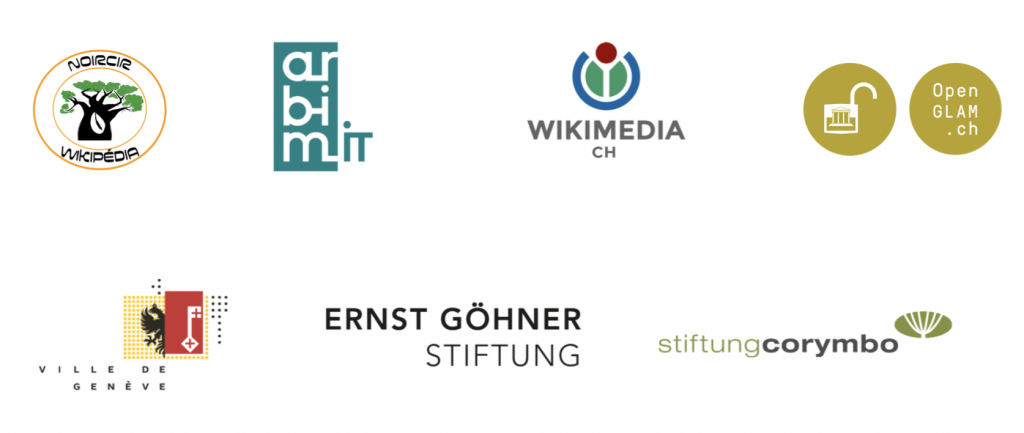
The event is also organized in collaboration with Open Science for arts, design and music (https://meta.wikimedia.org/wiki/Open_Science_for_Arts,_Design_and_Music).
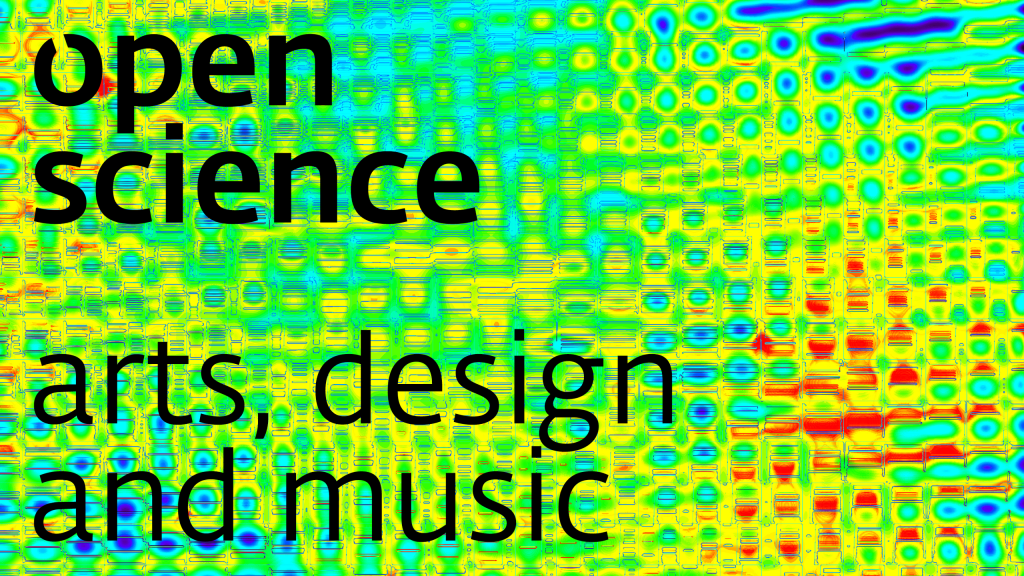
What else….
Watch the final video and the project presentations from the GLAMHack 2022 in Mendrisio.
Learn more about the first eight Open Swiss Cultural Data Hackathons.
In the meantime follow Opendata.ch on Twitter, LinkedIn.
Check out our website.
Check out our open GLAM Newsletter and Opendata.ch Newsletter.
Stay tuned for more or write to [gaston.wey at opendata.ch] for more information.
Curious about all things GLAM (Galleries, Libraries, Archives and Museums)? Check out our website.
We can’t wait to see and hack with you!
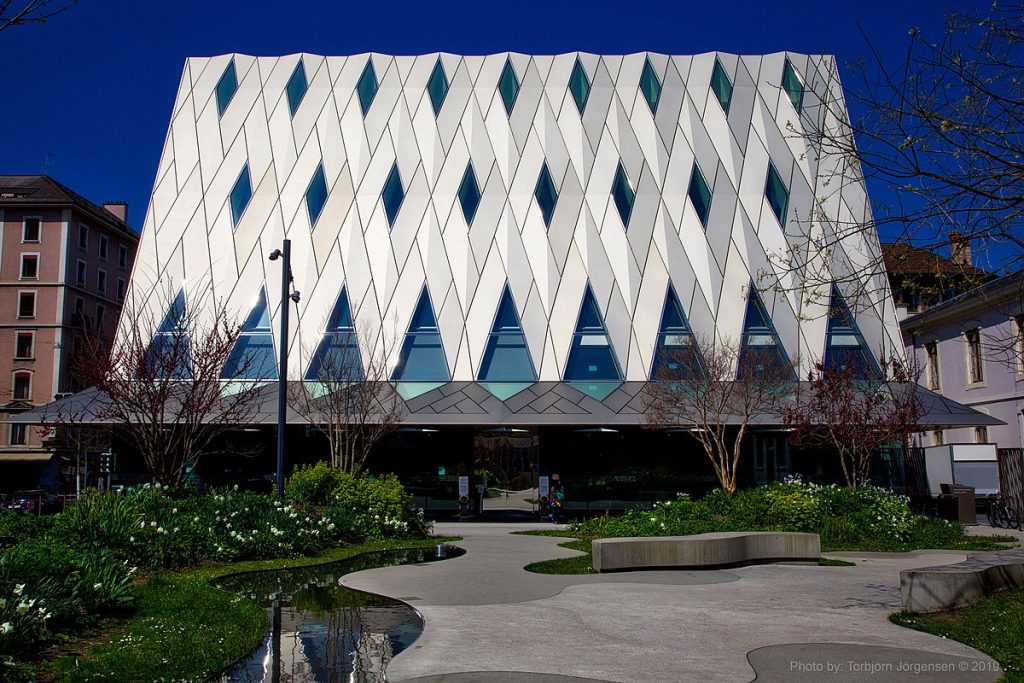
Torbjorn Toby Jorgensen, CC BY-SA 2.0 https://creativecommons.org/licenses/by-sa/2.0, via Wikimedia Commons
